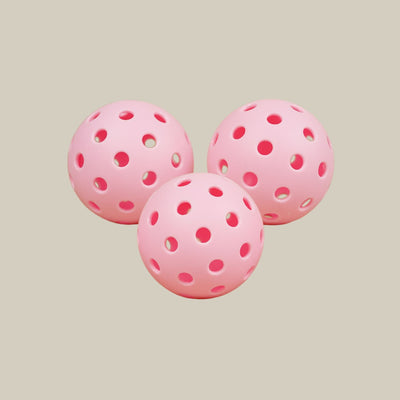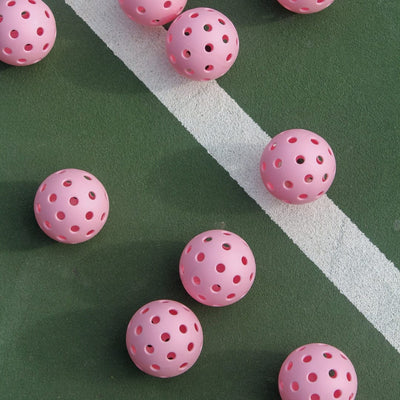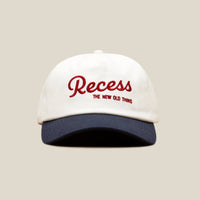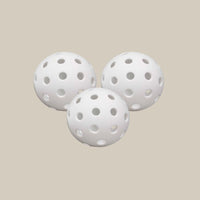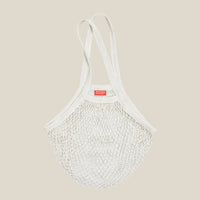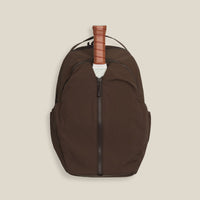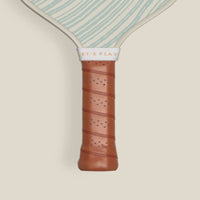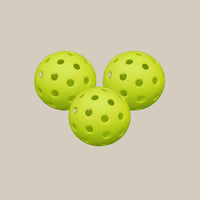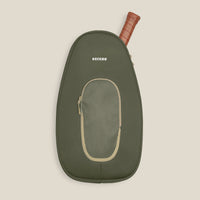We're partnering with Hattie Sherman, friend of Recess and breast cancer survivor, to bring back the limited edition Breast Cancer Awareness pickleball paddle and pink pickleballs. Follow along to learn more about Hattie's experience with breast cancer, what she learned along the way and how it's shaped her life.
Tell us about you!
Hi there! My name is Hattie. I’m a 29 year old architectural designer currently working in restaurant and hotel design. I’m a native Austinite who moved home a little over two years ago and am trying to soak up every minute of it. I’m an avid reader, dog-mom, artist, and taco fanatic.
Can you tell us your story and experience of being diagnosed with breast cancer?
Two years ago during the pandemic, I found a tootsie roll sized lump in my chest when wiping soap off in the shower. I had been to the doctor six weeks before I found the mass and had a manual check and it wasn’t discovered. Normally, I wouldn’t have given it a second thought, especially because I had just been checked, but something made me call the doctor.
Due to my family history (both my mom and grandmother have been diagnosed with breast cancer) the doctors were quick to act and got me an appointment for the very next day. After multiple tests throughout the week, I was diagnosed with triple-negative breast cancer. We caught it at an early stage but due to the severity of the cancer type, the recommended treatment was a double mastectomy. A double mastectomy is the complete removal of both breasts and all breast tissue. I had the surgery a month to the day I found the mass, and had a second surgery three months after for reconstruction.
The process was a complete whirlwind. This all started the week I moved home from living in New York and the week I was supposed to start a new job. I worked three days and then had to take medical leave for my recovery. It was overwhelming and all I could do was put one foot in front of the other.
Over time I gradually began to process all that had happened and absorb the weight of it all. I felt a great sense of loss - for my innocence, for control, for a body that works like I expect it to, and the life I lived before. The weight of this loss was unexpected and heavy.
A big part of this too were the implications of my diagnosis to my family. As I said earlier, both my mom and grandmother had breast cancer. My mom was diagnosed younger too (at 46) and since she had four daughters she had genetic testing done to learn what our risk factors were. We were told we didn’t have a cancer causing gene. When I was diagnosed at 27, it became obvious there had to be a hereditary reason at play. Since my diagnosis, my whole family has been genetic tested. We have found a genetic link between all of us who have been diagnosed but, as of now, the research in this area isn’t to a point where we can officially prove the connection.
An important detail that hasn’t been brought up yet, is I have an identical twin sister and younger twin sisters. Considering my twin sister and I have the same genetic make-up, our doctors recommended she get a prophylactic double mastectomy to reduce her risk. She had her first surgery in March and will have her second in a few weeks. Our little sisters have been genetically tested and don’t have the same genetic mutation as my mom, grandmother, twin sister and me.
As I started working through everything that happened, it became blatantly obvious we have holes in our society surrounding the topic of breast cancer. The statistics are rising yearly for young women with breast cancer but no one is talking about it. Women need to be aware and educated earlier than they are. Once I decided to share my story and use it as a way to educate other women, the dark cloud of fear in this time began to evolve into a sense of purpose. I’m in a unique position to support women living with a breast cancer diagnoses, and to educate young people who may not know they are at risk.
What brought you comfort or helped you feel like yourself during this season of your life?
No matter what your treatment is or how severe, having cancer and being treated for it is a traumatic experience not only physically but also emotionally.
The biggest piece of advice I can give is to lean into “your people.” This season of change is too much to carry on your own. I’m not someone who typically reaches out for help when going through a hard time, but my family and friends didn’t give me much of a choice in the matter :). I came home from the hospital to a house full of banners, flowers, gifts, notes, and had countless voicemails. I felt immediately held and supported by my people who were physically there and from those who weren’t, and their support continued as long as I needed it.
Finding ways to have autonomy and taking the time to focus on myself also made such a difference. For me the first step was looking like “me”. As soon as I was able, I stripped off my pjs and put on a button down and a pair of jeans (if you know me this is my daily uniform.) I put them on and went back to my movie marathon. Seeing yourself looking back at you in the mirror is huge. An important piece of my story is that this journey began the week I moved back to Austin. So I found a lot of comfort in finding that autonomy (i.e. finally being able to drive and explore town, moving into my apartment, decorating it, starting my new job etc.) My emotional healing was very intertwined with me finding my new Austin routine.
What did you learn about yourself through this experience?
I think any life threatening event, whether it be cancer or something else, forces you to have a more bird’s eye view of your life and what matters. You realize life is unpredictable, and no amount of worrying can make it less so.
Before my diagnosis, I was a massive people pleaser. I was hyper aware of other people's needs and would bend over backwards to make them feel comfortable. I very much lived for other people - It was exhausting. With my diagnosis I was forced to think about my emotional and physical restrictions and make my needs the most important in the room. It made me realize life is too short to not live 100% for yourself and true to how you are in the moment. We should be as messy, weird, broken, joyful, and as over the top as we want to be and shouldn’t be pushing anything authentic to the sidelines.
I used to shy away from opening up about the intimate details of my life. It felt like something that had to be earned. This is still true, but after living through this experience and struggling to find someone to learn from who had been diagnosed at such a young age and walked the same path, I knew speaking up could help future women like me. The biggest blessing this experience has given me is it’s helped me find my voice and learn that there is power in vulnerability.
What does life look like now?
I have an amazing group of friends, adopted a dog, am learning a lot at my job, am in a healthy relationship, see my family regularly, and swim at Barton Springs every Saturday. I love the life I’ve worked to create here and I’m proud of it.
With regards to breast cancer specifically, I’m out of the woods for now. I get screened every 6 months and will be until I’m five-years cancer free. There will be future hoops when I’m ready to consider having children and after I go through menopause, but I’m choosing to not worry about either until I get there.
My focus right now is to be as present as I can every day and spread my experience in a way that hopefully helps someone else walking a similar path.
How did you get involved with the Breast Cancer Research Foundation? Can you tell us about the impact that it has for others going through treatment?
The Breast Cancer Research Foundation (BCRF) was brought to my attention by my oncologist. A handful of people had reached out to me asking where I suggested they donate. I looked for foundations focused on younger women with cancer or foundations that used funds for hereditary research, but was struggling to find any foundations that focused on either specifically. My doctor recommended BCRF as it is the largest private funder of breast cancer research worldwide. Their resources go towards research in genetics, lifestyle and prevention, metastatic breast cancer, post-treatment care, and tumor biology.
There are a lot of organizations that do fantastic advocacy and education work. Many of these focus on awareness - you’ve probably seen dozens of posters, videos or marches - but progress needs to be made particularly with how they communicate to the younger population.
Currently 1 in 8 women will be diagnosed with breast cancer in their lifetime, and 1 in 1,000 pregnancies are complicated by a breast cancer diagnosis. The fact that these numbers are so high and rising, proves to me there needs to be improvements made in all aspects of how we attack this disease - from not only a medical standpoint but also socially. I believe this starts with increased funding to research. Right now, the only women screened before 40 are those known to be "BRCA positive". Two gene mutations, variants of the BRCA1 and BRCA2 genes, have been proven to increase the likelihood of developing breast cancer to 45%-85%. People who test positive for either of these gene variants, can receive annual screening as early as the age of 25. These are the only two genetic mutations that have been studied and proven to cause breast cancer, but there are thought to be over 500 more, including the one that runs in my family, that have yet to be studied.
I’m giving to BCRF because I believe research on the genetics of breast cancer is our best hope for identifying at-risk women and catching more cases before they become cancer.
Why did you decide to partner with Recess for the fundraiser?
Throughout my treatment and recovery, I noticed a shortage of resources focused on younger women and that most events were full of mostly middle-aged people. There was a massive hole that I felt desperately needed to be filled, which is where the idea for Pickleball for Pink began.
Recess is a brand that at its core is approachable, attractive to all age groups, and fun. When Maggie and Grace approached me about wanting to partner on a paddle it felt like an obvious fit. It’s easy for anything focused on a topic like cancer to quickly become dull and scary, but we feel like it should celebrate being here now and living everyday to the fullest.
What advice do you have for other women your age, or other women going through a similar experience?
It’s easy for young women to lean on the argument that worrying about the big “c” word is something they can punt to their late 40s or 50s. It’s what the medical profession preaches and how society currently talks about it too, but we need to change that mentality. It can happen and the statistics show there has been a steady rise in cases each year.
My biggest advice would be to make a monthly breast check part of your routine. It takes a few minutes in the shower. You know your body better than anybody and you’ll be the first to notice if there is a major change.
I’d also recommend learning your risk factors. Figure out who in your family has been diagnosed and talk to your doctor about it. If you find out quite a few people in your family have had it, I’d suggest having them get genetic tested.
Another big one is don’t jump to the worst case scenario if you find a lump in your chest. Younger women have very lumpy breast tissue and you will likely find one at some point. Do get it checked out, but it most likely isn’t anything to worry about.
If you do, however, end up walking this path, you are brave, strong, and will get through this. There is no “right” way to move forward but however you are dealing with it is the right way for you. As I answered on another question, lean on your people. Be selfish. Do what you need to do to feel like you. Find people who have gone through this and learn what worked for them. We are more powerful as a team and there is no reason you should feel alone when going through this experience.
